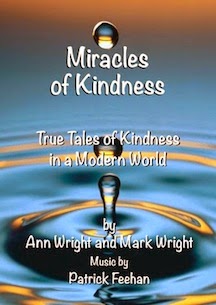There's some - though notably less - information out there about how being a writer impacts on the rest of your life (and the lives of those closest to you), and even a little about how your writing can help others.
What struck me recently though was how often writers are the recipients of kindness from other writers. Even when they're embroiled and immersed and often submerged in their own work writers will give you an honest opinion. They'll also add a review or offer a blog interview or tell their friends about your book, or make a you a cake with your cover on it. (I'm told that happens...) If you write you are a part of a culturally rich and diverse community.
At A Word with You Press, time and again I have seen connections form over a love of words and stories, and the transformative and liberating power of language. More than that, I see kindness in action. A friendly word to a fledgling writer sharing their work for the very first time, or a question answered, or an insight offered. Each time seeking only to lighten someone else's literary load. (Yes, I do love alliteration.)
It's a cliche that writers are competitive, frustration-filled adversaries, fuming at one another's successes. I have to tell you though that it's not my experience. Writers understand one another's struggles to make sense of the stories in their heads and the all-consuming desire to spend chunks of their otherwise perfectly happy lives in isolation, staring at the screen or the page.
Yes, we obsess about feedback, reviews and 'the numbers'. However, I have a theory about all that. I think, rather than yearning for fame and fortune, we are really looking for some indication that it's getting easier. A sign - from royalty sheets or online reviews or attendance at book signings - that we are making progress along the path we have chosen. We want to know it's getting easier because we also know, come what may, we will never stop writing.
If you're in need of a reminder that the glass is half-full, there's a collection of uplifting true stories available, which includes my anecdote Street Angel.
Miracles of Kindness
True Tales of Kindness in the Modern World
Miracles of Kindness is also available in a multimedia format on iTunes.
Miracles of Kindness is a collection of stories, submitted by participants from all over the world and rewritten for dramatic consistency, that tell of simple acts of kindness that have had a profound effect on people’s lives. The stories are told from the perspective of the recipient of the act, so that the impact of the miracle of the event, spelled with a small “m”, can be truly felt. There are also three “Profiles in Kindness” stories which tell of visionaries who helped thousands of people by simple but determined acts. The stories in Miracles of Kindness range greatly in subject matter, from simple acts like a well-timed hug or the return of a lost wallet to getting a wounded grandmother to a hospital or helping to find sobriety for a lost soul. Each story will inspire as you are reunited with humanity’s good side.










